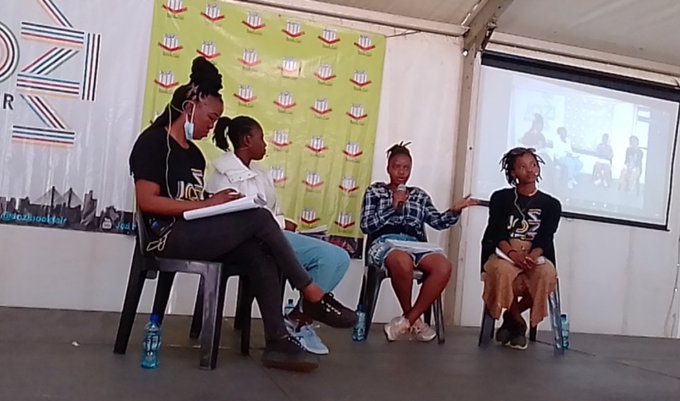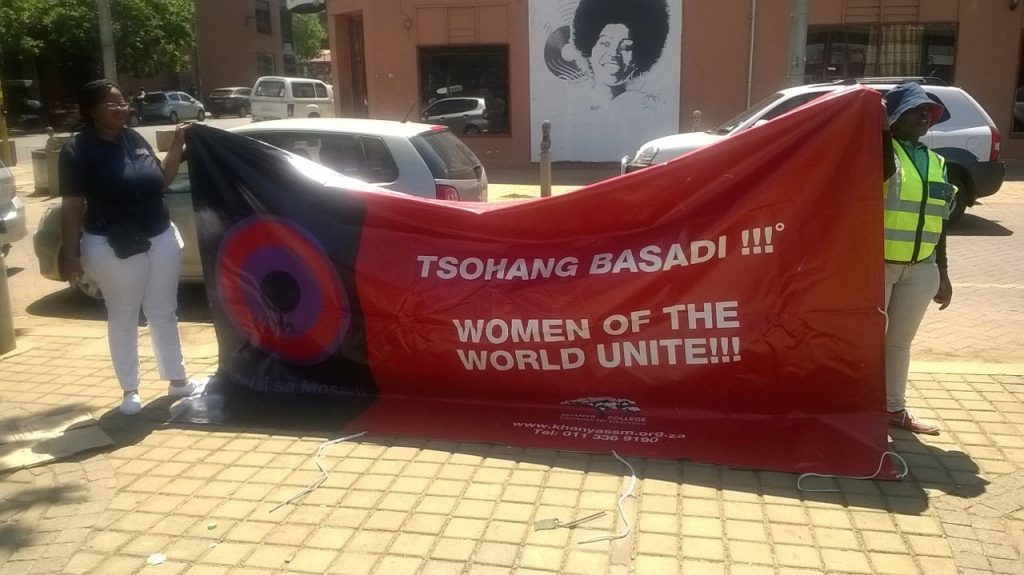On Sunday, 30 October 2022, the 14th Jozi Book Fair became host to a powerful feminist dialogue rested on icon, Lauretta Ngcobo’s And They Did not Die. The conversation unpacked the unwaving spirit of solidarity, strength and challenges women displayed to triumph during the apartheid. The discussion brought together women from different walks of life, amongst them was Barbara Boswell who is an Associate Professor at the University of Cape Town; Project Coordinator at Jozi Book Fair Nosipho Mdletshe and the Moderator of the dialogue, Poppy Makhubo a content creator and Creative Manager at Habitat 61 Creative Hub. They were joined by poet, writer and activitist based at Khanya College, Naobi Dube and Andile Ngema a Community Health Care Worker from the Gauteng Community Health Care Forum.
The conversation drew on several topics including the theme of the book, that the ‘personal is political’, bantustan women’s struggles during the apartheid era, the double oppression towards women and the exploitation of workers by Capitalists.
Boswell opened the conversation by unpacked the theme of the book – the ‘personal is political.’ She referred to the fact that everything women do in their personal lives, to liberate themselves from the patriarchal system eventually becomes political and vice versa.
This statement set a very firm tone for speakers and audience at large about the strengths and the impact women had and still have in the history of South Africa. Dube highlighted the spirit of solidarity these women had towards one another in fighting apartheid laws, how their church gatherings became their safe space to talk about their social problems. During these gatherings, wrote Ngcobo, Jezile and the other women made collective decisions not to conform to the apartheid pass laws. They collectively boycotted the law.
The book also zooms on how customary law and apartheid law conspired to oppress women. Boswell explored the role women played in advancing Patriarchy. She alluded to the fact that “men are not the only practitioners of patriarchy, women also engage in patriarchal behaviour.”
In the book this is evident with MaBiyela who is Jezile’s mother in law. MaBiyela pressurised Jezile to fall pregnant to validate her status in society, she also watched over her while her husband was in the city for work. In this context we see the mother in-law as the head of the household, watching everything step daughters-in-law took while their husbands were away. The mothers-in-law were the enforcers of culture and tradition to protect their sons’ legacies.
Makhubo explained how women were fighting apartheid oppression but losing the battle in their personal lives. During those days, women’s success and identity were defined by marriage and having children, Makhubo explained, this being the main way women gained status and recognition in society.
The conversation also drew comparisons between women during apartheid era and today. The fact that nothing has really changed is disheartening, women are still disempowered in their personal lives. “Women are still sacrificing themselves to advance the patriarchal system,” exclaimed Ngema. “We still see how the pressure of managing families still lies on women bearing children,” she added.
The dialogue further explored the consequence of the apartheid laws on black families. The apartheid system tore the fabric of African families, it did not allow African families to thrive, explained Boswell. Women were not allowed to visit their husbands as they wished, the permission system degraded and humiliated these women. The system was not easy at all for men too. The work conditions were degrading, workers such as Siyalo and others had to sleep in corridors and were exploited to maximise profits.
Women’s strength and their resilient spirit was the centre of the dialogue. As the title goes, “And they didn’t die”, the book highlights women’s contributions and undying spirits in conquering those struggles.
Indeed, they didn’t die, we still see their spirit in the current fight against the scourge of gender-based-violence and systems oppressing women.
This article was submitted on 30 October 2022. You may republish this article, so long as you credit the authors and Karibu! Online (www.Karibu.org.za), and do not change the text. Please include a link back to the original article.


 Download PDF
Download PDF
